七年级英语下册Unit12WhatdidyoudolastweekendSectionB(1a_1e)教案(新版)人教新目标版
七年级英语下册unit12_What_did_you_do_last_weekend_Section_A_2
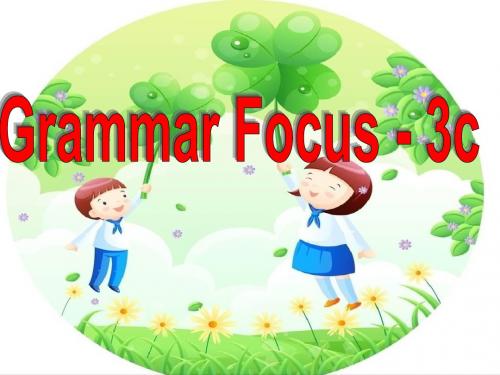
7. 她去了农场。
____________________________ She went to the farm.
8. 她和谁一起去的?
____________________________ Who did she go with?
9. 她和她的同学们一起去的。 She went with her classmates. ____________________________
1. A: ______ What did you do last weekend? B: I played badminton on Saturday. A: Sounds fun! _____ Who did you play with? B: I played with my father. He’s really good!
阅读Grammar Focus部分,完成
下列句子。 1. 上个周末你做什么了? What did you do last weekend? ___________________________ 2. 我做了我的家庭作业。 I did my homework. __________________
_____ Why _____ were you late yesterday?
2. 特殊疑问词 + did + 动词原形 + 主语 +其 他? 昨天他做了什么事情? _____ What ____ did he do yesterday? 上个周末她参观了什么地方? ______ Where ____ did she _____ visit last weekend? 你和谁一起去的动物园? ____ Who ____ did you go to the zoo _____? with 他们什么时候到达北京的? _____ When ____ did they arrive in Beijing?
人教版英语七年级下册 短语句型知识点总结 Unit12 What did you do last weekend

Unit12 What did you do last weekend?◆短语归纳1. do my homework 做我的家庭作业2. go to cinema 去看电影3. go boating / camping 去划船/ 去野营4. play badminton 打羽毛球5. on Saturday morning 在星期六早上6. work as 以……身份而工作7. have a good weekend 周末过得愉快8. kind of 有点儿9. stay up late 熬夜10. run away 跑开11. shout at 对……大声叫嚷12. fly a kite 放风筝13. high school 中学14. put up 搭起,举起15. in the countryside 在乡下16. get a surprise 吃惊17. make a fire 生火18. each other 互相19. so… that… 如此……以至于……20. go to sleep 入睡21. the next morning 第二天早上22. look out of…向……外看23. shout to 冲……喊叫;呼唤24. up and down 上上下下25. wake…up 把……弄醒26. move into… 移进……27. a swimming pool 一个游泳池28. camp by the lake 在湖边露营29. go to the beach 去海滩30. the National History Museum 国家历史博物馆31. tell sb about sth 告诉某人关于某事32. living habit 生活习惯33. lose things 丢东西34. play with sb 和某人玩35. have so much fun 玩得很开心、过得很愉快36. shout at sb 对某人大声喊、呵斥某人37. learn the second language 学习第二种语言38. go to the mountains 去爬山39. study for the test 为考试而学习40. have dinner with sb 和某人一起吃晚饭41. swimming pool 游泳池42. be afraid of ... 害怕......43. climb onto one’s back 爬到某人背上44. take a long bus ride to... 乘坐长途公共汽车去....45. keep sb warm 使某人保暖46. cook food on the fire烧饭、做饭47. so...that... 如此......以至于...... 48. look out of ...向......外看49. know about知道、了解50. jump up and down 上蹦下跳51. feel sb /sth doing 感觉某人/某物在做某事52. go near sb/sth 靠近某人/物53. learn from ... 向......学习;从...中汲取54. a useful lesson 有用的一课◆不规则动词的过去式◆用法集萃1. go + doing 去做某事2. play + 球类玩……球3. 时间段+ ago ……前4. keep + sb. / sth. + 形容词/ 副词/ 介词短语使……保持……5. so + 形容词/ 副词+ that 句子如此……以至于……6. see sb. doing sth. 看见某人正在做某事7. let sb. do sth. 让某人做某事8. start to do / doing sth. 开始做某事◆典句必背1. —What did you do last weekend? 上个周末你做什么了?—I did my homework. / We went boating. 我做了我的家庭作业。
012版新目标英语七年级下册unit12_What_did_you_do_last_weekend
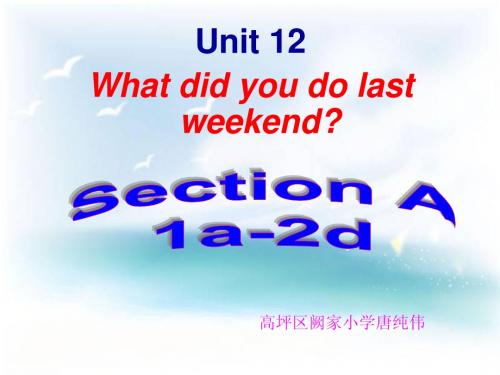
He studied for his English test.
Where did Jack go last weekend?
He went to the farm.
What did he do there?
He fed some cows there.
sheep
butterfly
visitor
1. sheep 名词,意为“绵羊”。它是单复 数同形的单词,当它作主语时谓语动词 的单复数形式要根据它在句中的意思来 确定。类似的单词还有deer (鹿), Chinese (中国人)等。例如: Where are your sheep, Ted? Every sheep has a thick woolly coat. 每只羊身上都穿着一件厚的羊毛外套。
2. I worked as a guide at the Natural History Museum. 我在自然历史博物馆里做导游的工作。 “work as + 职业” 意为“做某工作”。 例如: 埃里克在那家俱乐部里做音乐老师的工 作。 Eric works as a music teacher in the club.
What did he do?
He went to the cinema.
What did they do?
They went to the beach.
What did they do?
They went fishing.
What did he do last weekend?
He did his homework.
Student A asks questions with who, 2c what or where and Student B answers. Then change roles.
Unit12Whatdidyoudolastweekend知识点人教版七年级英语下册

Unit12 What did you do last weekend?句子词汇精讲【重点短语】1. last weekend 上周末2. go to the cinema 看电影3. go boating 去划船4. camp by the lake 在湖边露营5. go to the beach 去海滩6. study for the English test 为了英语考试学习7. feed some cows 喂一些奶牛8. work as a guide 做导游工作9. over 200 kinds ofbutterflies 超过200多种蝴蝶10. living habits 生活习惯11. be kind of tired 有点儿累12. stay up 熬夜13.as a special gift 作为一个特殊的礼物14. put up the tents 搭建帐篷15. make a fire 生火16. keep sb. warm 使某人保持温暖17.so...that... 如此…以至于…18. get a surprise 吃惊19. see sb. doing sth. 看见某人正在做某事20. jump up and down 上蹦下跳21. climb onto one’s back 爬到某人背上22. shout at/shout to 大声喊叫23. wake …up 把...弄醒24. a useful lesson 有用的一课1.by the lakeby介词, 意为“在……旁边”,表示位置,相当于beside。
拓展:by作介词的其他常见用法:(1)表示移动方向,意为“经过”。
例如:My mother goes by the building every day. 我妈妈每天从这栋楼旁边经过。
(2)表示方式及手段,意为“用,靠,通过”。
He makes a living by fishing. 他以捕鱼为生。
人教版英语七年级下册单元Unit 12 知识点+测试卷+思维导图

Unit 12 What did you do last weekend?1.重点词汇:lake, beach, sheep, kite, moon, snake, forest, surprise, pretty, natural, shout, fly, stay, move, jump, wake2. 短语归纳:1.work as 以……身份而工作2.have a good weekend 周末过得愉快3.kind of 有点儿4.stay up late 熬夜5.run away 跑开6.shout at 对……大声叫嚷7.put up 搭起,举起8.in the countryside 在乡下9.get a surprise 吃惊10.make a fire 生火11.each other 互相12.so… that… 如此……以至于……13.look out of… 向……外看14.up and down 上上下下15.wake…up 把……弄醒16.move into… 移进……3. 必背典句:1. —What did you do last weekend? 上个周末你做什么了?—I did my homework. / We went boating. 我做了我的家庭作业。
/我们去划船了。
2. —Who visited her grandma? 谁看望了她的奶奶?—Becky did. 贝姬看望了。
3. My sister finished high school two weeks ago. 我的姐姐两周前中学毕业了。
4. But I was so tired that I went to sleep early. 但是我是如此疲倦,以至于我很早就睡着了。
4.语法知识:1. 一般过去时的几种句型:(1)be动词的一般过去时的句型:①肯定句结构为:主语+was / were+其它。
七年级英语下册unit12_What_did_you_do_last_weekend
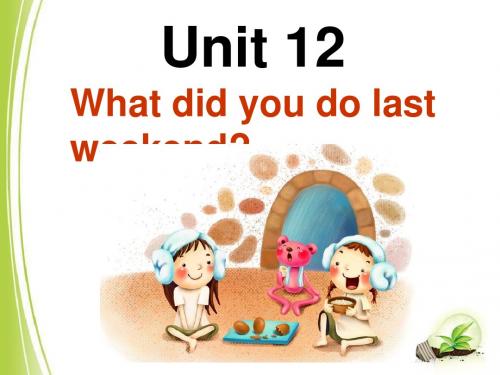
1. I worked as a guide at the Natural History Museum. 我在自然历史博物馆里做导游的工作。 “work as + 职业” 意为“做某工作”。 例如: Eric works as a music teacher in the club. 埃里克在那家俱乐部里做音乐老师的工作。 2.How interesting! 多么有趣啊! 这是一个感叹句,句子结构为: How + 形容词或副词 + (主语 + 谓语)! 例如:How interesting the book is! 那本书太有趣了! 3. stay up 意为“熬夜;深夜不眠” 。 例如: Don’t stay up late. It’s bad for your health. 不要熬夜,这对你的健康不好。
Who ____ did you go to the zoo _____? with 3.____ 你和谁一起去的动物园?
When ____ did they arrive in Beijing?他们什么时候到达北京的? 4._____
对下列句子中的划线部分提问。
1. I got up at nine yesterday morning. ______ ___ you get up yesterday morning? When did 2. We did our homework last night. _____ What ____ did you ___ do last night? 3. They were in the supermarket last Sunday. Where _____ were they last Sunday? _______ 4.My last weekend was kind of boring. How _____ was your last weekend? _____ 5.Linda took a walk with her parents after dinner. _____ Who ____ did Linda take a walk with after dinner?
人教版新目标七年级下学期Unit-12--what-did-you-do-last-weekend--知识点

Unit 12 what did you do last weekend?Section A 知识讲解一. last(1)last形容词“最后的,最末的”或者“紧接前面的,刚过去的”。
Today is the last day in the year.最后一天。
I didn’t sleep well last night. 昨晚(2)last副词,“最后地”,I’m the last one.最后一个。
(3)last 动词,“持续,继续,维持”等,The hot weather lasted a week.持续了一周。
二. camp(1)camp 动词,“扎营,搭帐篷”。
We go camping every summer.We walked all day and camped by a river at night.(2)camp 名词,“露营地,度假营”。
Let’s go back to the camp, it’s getting dark. 让我们回营地吧,天黑下来了。
根据汉语提示填空。
(1)When did you join the ______ ______ (夏令营)?(2)I like ______ ______ (去宿营)in the open air.3)We______(宿营)in the forest last night. (4)Let’s go back to the ______(营地)三. sheepsheep 可数名词,“绵羊”,复数还是sheep;goat指山羊。
How many sheep are there on your farm? 你们农场里有多少只羊?拓展:常见的单复数同形的名词还有:deer (鹿),fish (鱼),Chinese (中国人),Japanese(日本人)等。
四. byby介词, “在……旁边”,相当于beside。
Our teacher is sitting by the window.by与交通工具名词连用时,名词前不用冠词,意为“乘、坐、用”等。
人教版英语七下U12 What did you do last weekend 讲义(学生版)

Unit12 What did you do last weekend?一、重点词汇及拓展1. campv. __________________ 去野营n. __________________ 去野营2. asprep. ______e.g. ________________________ 我在这儿作导游。
prep. ______e.g. ________________________ 他和我跑得一样快。
____________ 和...一样____________ 众所周知3. natural adj. ______e.g. ____________________________________自然博物馆里有许多蝴蝶。
______ n. 自然____________ 在大自然中____________ 享受大自然4. tired adj.__________________劳累;疲倦5. stayv.__________________待在家v.__________________保持健康____________熬夜____________远离...6. run away ______put away ______take away ______throw away ______give away ______go away ______7. mouse n.______复数:______8. shout v.____________呼喊...______朝...喊叫(带有情绪)9. language n.____________身体语言____________语言的美____________第二语言10. flyv.______e.g. ____________________________________他们在湖边放风筝。
____________飞去某地n.______e.g. __________________ 我讨厌苍蝇。
(水滴系列)七年级英语下册 Unit 12 What did you do last weekend

Unit 12 What did you do last weekend?Grammar Focus-3cTeaching and learninggoals:一、语言知识:1. Learn to use the following new words and phrases:run away, mice, mouse, baby, shout at, woof, language2. Learn to use the following sentences:What did you do last weekend?I did my homework./ We went shopping.Who visited her grandma? Becky did.Where did she go last weekend? She went to a farm.Who did she go with? She went with her classmates.二、语言功能:Learn to describe the past events using the sentence structures: What did…? Where did/ was/ were…? Who did/ was/ were…?三、学习策略:1. 能正确使用一般过去时态的各种句式来描述过去发生的事情。
2. 能灵活分辨动词过去式的规则变化和不规则变化。
四、情感态度:1. 了解掌握一门外语的重要性。
2. 让学生合理安排上学日和周末的时间,丰富课外活动,劳逸结合,享受美好生活。
【设计意图】目标引领,从四个方面表述了本节语法课的语言知识、语言功能、学习策略和情感目标。
尤其突出了对所学语法在实际生活中的运用能力的培养, 使本节课更具针对性和高效性,更贴近生活并服务于生活。
Teaching and learning steps:Step1. PreviewI.短语连线。
初中英语 七年级下册 Unit12 What did you do last weekend
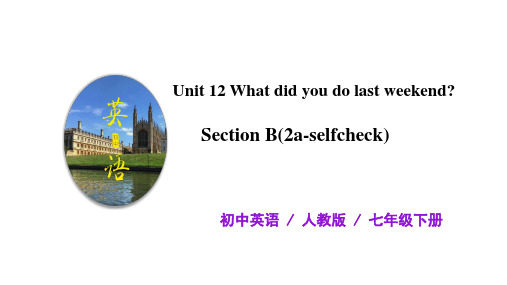
2c Put the phrases in order according to the passage. Then use them to retell the story.
__6__ snake went into the forest __2__ put up our tests and cooked food __8__ learned a useful lesson __4__ saw a snake and shouted to parents for help __7__ snakes can’t hear but can feel things moving __5__ my dad jumped up and down in his tent __1__ took a bus to a small village in India __3__ told stories under the moon, then went to sleep
Language points
1. There we put up our tents and make a fire to keep us warm and cook food on. put up 在句中意为“搭起,搭建”;另外还 有“张贴;举起(手)”之意。
他们在这里盖了一栋新房子。 They put up a new house here. 迈克正把一张地图贴到墙上。 Mike is putting up a map on the wall. 谁知道答案?请举手。 Who knows the answer? Put up your hand.
surprise还可作不可数名词,意为“惊奇;吃 惊”。其常用短语有:
in surprise to one’s surprise
人教版七年级下册英语Unit12 What did you do last weekend教材听力原文及译文
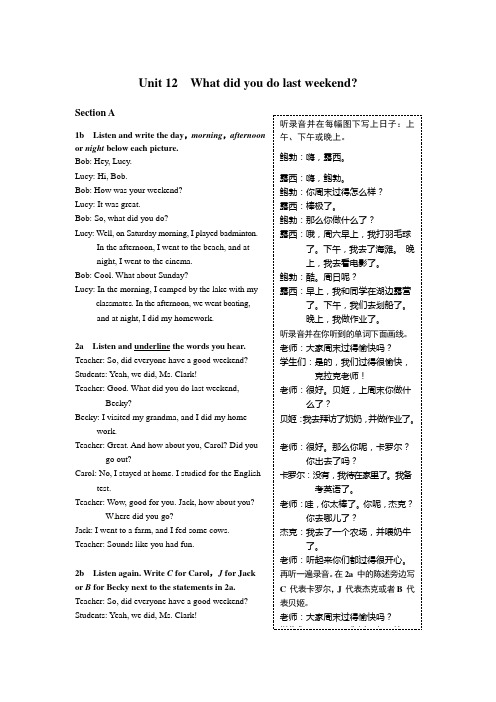
Unit 12 What did you do last weekend? Section A1b Listen and write the day,morning,afternoon or night below each picture.Bob: Hey, Lucy.Lucy: Hi, Bob.Bob: How was your weekend?Lucy: It was great.Bob: So, what did you do?Lucy: Well, on Saturday morning, I played badminton.In the afternoon, I went to the beach, and atnight, I went to the cinema.Bob: Cool. What about Sunday?Lucy: In the morning, I camped by the lake with my classmates. In the afternoon, we went boating,and at night, I did my homework.2a Listen and underline the words you hear. Teacher: So, did everyone have a good weekend? Students: Yeah, we did, Ms. Clark!Teacher: Good. What did you do last weekend,Becky?Becky: I visited my grandma, and I did my home- work.Teacher: Great. And how about you, Carol? Did you go out?Carol: No, I stayed at home. I studied for the English test.Teacher: Wow, good for you. Jack, how about you?W here did you go?Jack: I went to a farm, and I fed some cows. Teacher: Sounds like you had fun.2b Listen again. Write C for Carol,J for Jack or B for Becky next to the statements in 2a. Teacher: So, did everyone have a good weekend? Students: Yeah, we did, Ms. Clark! 听录音并在每幅图下写上日子:上午、下午或晚上。
七年级英语下册Unit12Whatdidyoudolastweekend知识点
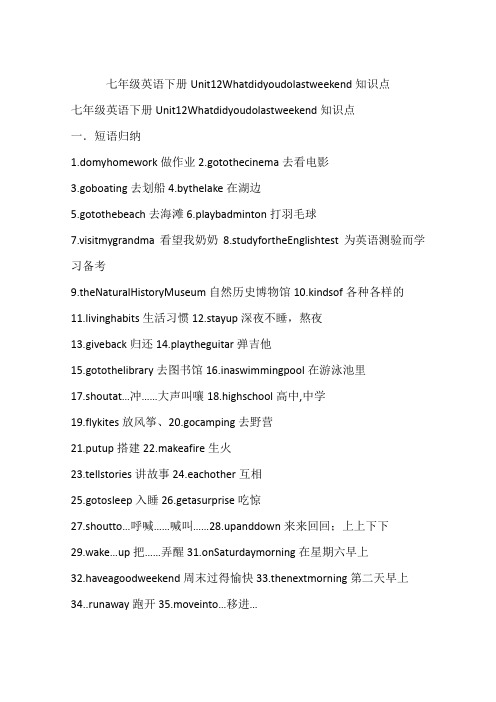
七年级英语下册Unit12Whatdidyoudolastweekend知识点七年级英语下册Unit12Whatdidyoudolastweekend知识点一.短语归纳1.domyhomework做作业2.gotothecinema去看电影3.goboating去划船4.bythelake在湖边5.gotothebeach去海滩6.playbadminton打羽毛球7.visitmygrandma看望我奶奶8.studyfortheEnglishtest为英语测验而学习备考9.theNaturalHistoryMuseum自然历史博物馆10.kindsof各种各样的11.livinghabits生活习惯12.stayup深夜不睡,熬夜13.giveback归还14.playtheguitar弹吉他15.gotothelibrary去图书馆16.inaswimmingpool在游泳池里17.shoutat…冲……大声叫嚷18.highschool高中,中学19.flykites放风筝、20.gocamping去野营21.putup搭建22.makeafire生火23.tellstories讲故事24.eachother互相25.gotosleep入睡26.getasurprise吃惊27.shoutto…呼喊……喊叫……28.upanddown来来回回;上上下下29.wake…up把……弄醒31.onSaturdaymorning在星期六早上32.haveagoodweekend周末过得愉快33.thenextmorning第二天早上34..runaway跑开35.moveinto…移进…二.用法集萃1.go+doing去做某事2.play+球类玩……球3.时间段+ago……前 4.keep+sb./sth.+形容词/副词/介词短语使……保持……5.so+形容词/副词+that句子如此……以至于……6.seesb.doingsth.看见某人正在做某事7.letsb.dosth.让某人做某事8.starttodo/doingsth.开始做某事三.重点句型1.—Whatdidyoudolastweekend?—Ididmyhomework.—上个周末你做了什么了?—我做我的家庭作业了。
人教版七年级下册英语Unit12What-did-you-do-last-weekend?知识点总结

七下Unit 12 What did you do last weekend?一、Important Phrases:1.go to the cinema 去影院★=go to the movies2.go boating/camping 去划船/野营★summer camp 夏令营3.camp by the lake 在湖边野营★by the pool在池边4.go to the beach 去海滩★on the beach 在沙滩上5.play badminton 打羽毛球play+球类/棋类名词(不加冠词)6. study for the test 备考★test=exam7.feed some sheep/cows喂羊/牛★feed(fed)on...以..为食,feed with...用...喂养8. work as a guide 做导游工作★work as +职业从事某工作9. at the Natural History Museum 自然历史博物馆★nature(n.不可数)大自然-natural(adj.)自然的10. over 200 kinds of butterflies 200多种蝴蝶★over=more than 超过11.living habits 生活习惯★make a living 谋生;eating habits饮食习惯12.kind of tired 有点累★kind of = a little13. stay up late 熬夜★stay at home 待在家,stay away from 远离,lately(adv.)最近地14.sleep early 早睡★sleepy 困的,asleep睡着的15.a family of mice 老鼠一家★mouse(单)-mice(复)16.be afraid of sth./to do 害怕★afraid=scared17.run away 跑开★take away 带走,put...away 把某物收拾好,give away 捐赠18. climb onto one’s back 爬上某人的背19. shout at/to sb.冲某人大叫★shout out 大喊出20. a second language 第二语言★mother tongue 母语21.fly a kite放风筝22.do something interesting 做有趣的事★修饰不定代词,adj.后置:anything special23.finish high school 中学毕业★finish doing sth 完成做某事24.a special gift一特殊礼物★gift=present25.take us to India 带我们去印度26.take a long bus ride 坐很久的公交车27.put up our tents 搭帐篷★put up:搭建,举起,张贴28.make a fire生火29.cook food on the fire 在火上做饭★on an open fire 明火,篝火30.tell cach other stories 互相讲故事★tell a lie 说谎,tell a joke 讲笑话31.keep sb.warm 使某人保持暖和32.sit under the moon 坐在月光下★moonlight月光,moon cake月饼33.so.......that.......如此...以致于...34.get a surprise 吃惊35. look out of...向外看★look out 小心,look for寻找,look after 照顾36. jump up and down 跳上跳下37. move into the forest 进入森林38. wake sb up叫醒某人★wake up醒来,awake醒着的39. read a book about history 读一本历史书★read...to sb给某人读...40.see an interesting talk show 看有趣的脱口秀二、Key Language Points:1.Where did you go last weekend? What did you do last weekend?上周末你去了哪里?上周末你做了什么?一般过去时的特殊疑问句:1)特殊疑问词+did+主语+v.(原)+其他?如疑问词作主语,则陈述语序,如:Who bought you this new dress?谁给你买的新裙子?2)特殊疑问词+was/were+主语+其他?Where were you last night?昨晚你在哪里?2.----Who visited her grandma? -----Becky did.为避免重复,常用do,does,did,so等代替前文提到的内容。
初中英语 七年级下册 Unit12 What did you do last weekend
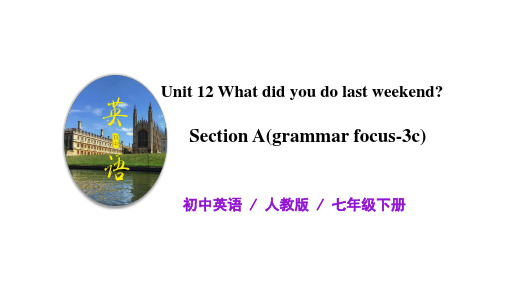
一般过去时的句式转换 1. 肯定句变否定句 (1)当句中含有情态动词 could, would, should
等时,可直接在情态动词后加 not。 You should go to the zoo first. You shouldn’t go to the zoo first.
3b Complete the passage with the correct forms
of the words in the box.
say be climb see run away
A family of mice were in the kitchen on Saturday morning when they __sa_w__ a big cat. Baby Mouse __w__a_s__ afraid and _c_li_m__b_e_d_ onto his father’s back.
(2) ① 昨天他做了什么事情? W__h_a_t_ _d_i_d_ he do yesterday?
② 上个周末她参观了什么地方? W__h_e_r_e_ _d_i_d_ she _v_i_si_t_ last weekend?
③ 你和谁一起去的动物园? _W__h_o_ _d_i_d_ you go to the zoo w__it_h_?
(2) 当句中含有 was/ were 时,可直接在was/ were 后加 not。 She was in the library yesterday. She wasn’t in the library yesterday.
(3)当句中的谓语动词是实义动词时,需在该动 词前加 didn’t,动词还原为原形。 She went to the park last week. She didn’t go to the park last week.
季七年级英语下册 Unit 12 What did you do last weekend课文重难点讲解(无答案)(新版)新人教版
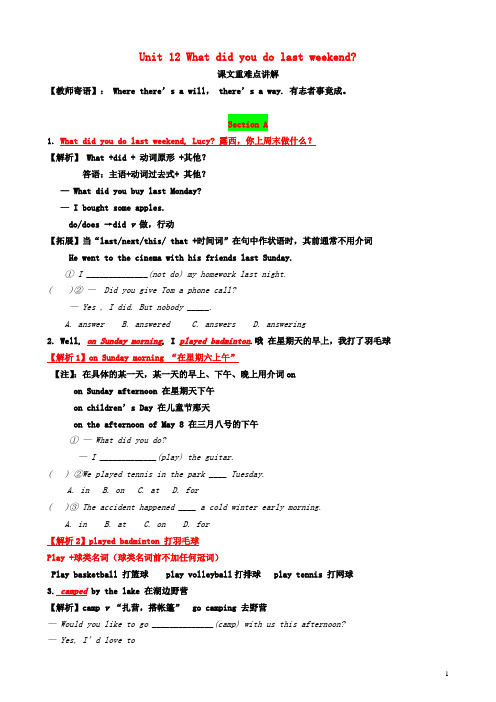
Unit 12 What did you do last weekend?课文重难点讲解【教师寄语】:Where there’s a will,there’s a way. 有志者事竟成。
Section A1. What did you do last weekend, Lucy? 露西,你上周末做什么?【解析】 What +did + 动词原形 +其他?答语:主语+动词过去式+ 其他?— What did you buy last Monday?— I bought some apples.do/does →did v 做,行动【拓展】当“last/next/this/ that +时间词”在句中作状语时,其前通常不用介词He went to the cinema with his friends last Sunday.① I ______________(not do) my homework last night.( )②—Did you give Tom a phone call?— Yes , I did. But nobody _____.A. answerB. answeredC. answersD. answering2. Well, on Sunday morning, I played badminton.哦在星期天的早上,我打了羽毛球【解析1】on Sunday morning “在星期六上午”【注】:在具体的某一天,某一天的早上、下午、晚上用介词onon Sunday afternoon 在星期天下午on children’s Day 在儿童节那天on the afternoon of May 8 在三月八号的下午①— What did you do?— I _____________(play) the guitar.( ) ②We played tennis in the park ____ Tuesday.A. inB. onC. atD. for( )③ The accident happened ____ a cold winter early morning.A. inB. atC. onD. for【解析2】played badminton 打羽毛球Play +球类名词(球类名词前不加任何冠词)Play basketball 打篮球 play volleyball打排球 play tennis 打网球3. camped by the lake 在湖边野营【解析】camp v“扎营,搭帐篷” go camping 去野营— Would you like to go ______________(camp) with us this afternoon?— Yes, I’d love to4. I studied for the math test. 我为数学测验而学习。
新目标版英语七年级下册Unit12Whatdidyoudolastweekend?(SectionB)含答案
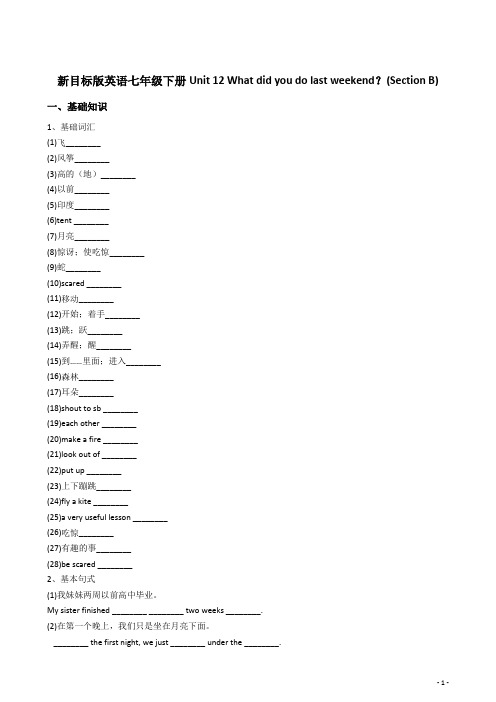
新目标版英语七年级下册Unit 12 What did you do last weekend?(Section B)一、基础知识1、基础词汇(1)飞________(2)风筝________(3)高的(地)________(4)以前________(5)印度________(6)tent ________(7)月亮________(8)惊讶;使吃惊________(9)蛇________(10)scared ________(11)移动________(12)开始;着手________(13)跳;跃________(14)弄醒;醒________(15)到……里面;进入________(16)森林________(17)耳朵________(18)shout to sb ________(19)each other ________(20)make a fire ________(21)look out of ________(22)put up ________(23)上下蹦跳________(24)fly a kite ________(25)a very useful lesson ________(26)吃惊________(27)有趣的事________(28)be scared ________2、基本句式(1)我妹妹两周以前高中毕业。
My sister finished ________ ________ two weeks ________.(2)在第一个晚上,我们只是坐在月亮下面。
________ the first night, we just ________ under the ________.(3)对我来说,这是一个非常有用的教训。
This was a very ________ lesson ________ me.(4)我爸爸开始在他们的帐篷里跳上跳下。
My dad started to ________ ________ ________ ________ ________ their ________.(5)我是如此累,以至于很早就去睡了。
人教版七年级英语(下)Unit12《Whatdidyoudolastweekend》微课精讲
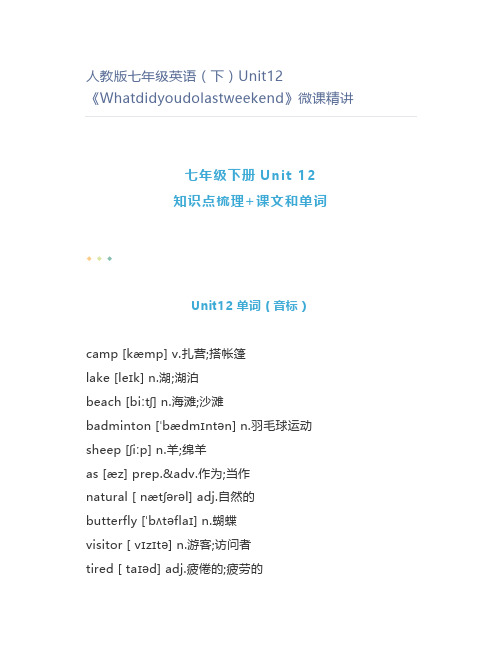
人教版七年级英语(下)Unit12《Whatdidyoudolastweekend》微课精讲七年级下册Unit 12知识点梳理+课文和单词◆◆◆Unit12 单词(音标)camp [kæmp] v.扎营;搭帐篷lake [leɪk] n.湖;湖泊beach [biːtʃ] n.海滩;沙滩badminton [ˈbædmɪntən] n.羽毛球运动sheep [ʃiːp] n.羊;绵羊as [æz] prep.&adv.作为;当作natural [ nætʃərəl] adj.自然的butterfly [ˈbʌtəflaɪ] n.蝴蝶visitor [ vɪzɪtə] n.游客;访问者tired [ taɪəd] adj.疲倦的;疲劳的stay [steɪ] v.停留;待stay up late 深夜不留睡;熬夜away [ə weɪ] adv.离开;远离run away [ rʌnəˌweɪ] 跑开mouse (pl. mice) 老鼠;耗子baby [ beɪbi] adj.&n.幼小的;婴儿shout [ʃaʊt] v.呼叫;喊叫shout a t… 冲……大声叫嚷woof int.(狗叫声)汪汪language [ læŋgwɪdʒ] n.语言fly (flew) v.飞kite [kaɪt] n.风筝fiy a kite 放风筝high [haɪ] adj.&adv.高的(地)high school 中学ago [ə gəʊ] adv.以前India [ ɪndɪə] n.印度tent [tent] n.帐篷put up [ pʊtʌp] 搭起;举起moon [muːn] n.月亮surprise [sə praɪz] n.&v.惊奇;惊讶;使吃惊get a surprise 吃惊snake [sneɪk] n.蛇scared [ /skeəd] adj.惊慌的;吓坏了的move [muːv] v.移动shout to… 对……大声喊叫start [stɑːt] v.开始;着手jump [dʒʌmp] v.跳;跃up and down 上上下下;起伏wake (woke) v.弄醒;醒wake…up 把……弄醒into [ ɪntuː] prep.到……里面;进入forest [ˈfɒrɪst] n.森林ear [ɪə] n.耳朵【重点短语】1. last weekend 上周末2. do one’s homework 做作业3. go to the cinema 看电影4. go boating 去划船5. camp by the lake 在湖边露营6. go to the beach 去海滩7. play badminton 打羽毛球8. on Saturday morning 在周六的早上9. study for the English test 为了英语考试学习10. feed some cows 喂一些奶牛11. work as a guide 做为一个导游工作12. Natural History Museum 自然历史博物馆13. butterfly house 蝴蝶馆14. over 200 kinds ofbutterflies 超过200多种蝴蝶15. tell sb about … 告诉某人关于…16. living habits 生活习惯17. be kind of tired 有点儿累19. stay up 熬夜20. play with sb. 和某人玩21. lose things 丢东西22. run away 跑开23. fly a kite 放风筝24.as a special gift 作为一个特殊的礼物25. take sb. to sp. 把某人带到某地26. go camping 去露营27. put up the tents 搭建帐篷28. make a fire 生火29. keep sb. warm 使某人保持温暖30. on the first night 在第一天晚上31.so...that... 如此…以至于…32. go to sleep 去睡觉33. get a surprise 吃惊34. see sb. doing sth. 看见某人正在做某事35. jump up and down 上蹦下跳36. climb onto one’s back 爬到某人背上37. shout at/shout to 大声喊叫38 wake …up 把...弄醒39. move into… 移入,爬进…中40. a useful lesson 有用的一课【重点句型】1.---What did you do last weekend?你上周末做了什么?---Well, on Saturday, I played badminton.噢.周六我打羽毛球了。
新人教 英语 七年级下册Unit12 What did you do last weekend知识点详解

Unit12 What did you do last weekend?知识点详解单元目标总览:【知识点详解】1、camped by the lake在湖边扎营(1)①camp 作动词,意为“扎营,搭帐篷”。
◆We go camping every summer. 我们每年夏天都去野营。
◆We walked all day and camped by a river at night.我们走了一天,晚上在一条河边宿营。
②camp 作名词,意为“露营地,度假营”。
◆Let’s go back to the camp, it’s getting dark. 让我们回营地吧,天黑下来了。
◆We spent two weeks at camp this summer. 我们今年夏天在度假营玩了两周。
(2)by介词, 意为“在……旁边”,表示位置,相当于beside。
◆Our teacher is sitting by the window. 我们老师坐在窗户旁边。
拓展:by作介词的其他常见用法:(1)表示移动方向,意为“经过”。
◆My mother goes by the building every day. 我妈妈每天从这栋楼旁边经过。
(2)表示方式及手段,意为“用,靠,通过”。
◆He makes a living by fishing. 他以捕鱼为生。
(3)与交通工具名词连用时,名词前不用冠词,意为“乘、坐、用”等。
◆I went there by bike. 我骑自行车去那儿的。
6. tired2、What did you do last weekend?上周末你做什么?What+did+主语+谓语动词原形+其他,这一特殊疑问句用来询问某人在过去某个时间或地点做过什么事情,其中did为助动词,没有人称和数的变化,谓语动词为实义动词原形。
◆—What did you do last night?昨晚你做了什么?—I visited my uncle.我看望了我的叔叔。
- 1、下载文档前请自行甄别文档内容的完整性,平台不提供额外的编辑、内容补充、找答案等附加服务。
- 2、"仅部分预览"的文档,不可在线预览部分如存在完整性等问题,可反馈申请退款(可完整预览的文档不适用该条件!)。
- 3、如文档侵犯您的权益,请联系客服反馈,我们会尽快为您处理(人工客服工作时间:9:00-18:30)。
教学
目标
1.Knowledge aims:Make the students master the language.
2.Ability aims:Learn to master the skills of listening.
Talk about past things correctly.
5’
10’
15’
10’
5’
板
书
设
计
Unit 12 What did you do last weekend?
Phrases: sang and played the guitar
went to the library
flew a kite……
教
学
后
记
Do more English speaking and language.
2.Sum up the usage of emphasize.
Ask the students to write answers or questions in3aindividually, using past events.Then check the answers ,ask and answer in pairs .
1..Ask the students to write some sentences using past events to describe their daily activities. Then check the answers in groups.
In groups the students interview at least three classmates about their daily activities .Then write a report about the result of interview.
Comare the speaking.
Remember the homework.
To introduce Ss to the unit goals.
To help Ss recognize the target language in natural speech.
Practice the speaking
Write another two reports accor ding to the information.
Homewo rk A,C.B,
Greet to the teacher.
Ss report their survey results.
Students revise the grammer, then make conversations the questions and answers by themselves.
Teach new words.
Explain the new words.
Make sentences with them.
1.Ask the studen ts to repeat the grammar , then go over the questions and answers by themselves.
3.Emotion aims:Educate them to love live.
教学
资源
Screen computer ,ppt
重点
难点
1.New words.
2.phrases and past eve nts.
教学过程
教学环节教师ຫໍສະໝຸດ 动学生活动设计意图
时间
Step 1
L eading-in
Step 2
Presentation
Step 3
Practicing
Step 4
Practicing
Step5
Exercises
Step 6
Homework
1. Greet to the students.
2. In groups, ask the students to report their past events
Ss write and make new sentences.
Write and check their sentences.
Check the answer.
Write a report about the result of their weekends .
Show their result .
